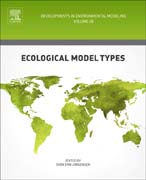
Ecological Model Types brings an understanding on how to quantitatively analyze complex and dynamic ecosystems with the tools available today. Ecosystem studies widely use the notions of order, complexity, randomness, and organization, and are used interchangeably in literature, which causes much confusion. Better models synthesize our knowledge on ecosystems and their environmental problems, in contrast to statistical analysis, which only reveal the relationships between the data. This book brings together experts on ecological models to create a definitive work on how to understand our complex Earth. Bridges the gap between statistical analysis and synthesis of data, enhancing our understanding about ecosystems and their environmental problemsHelps readers understand complex ecosystems by walking through the best modeling options to analyze and predict environmental effectsProvides a detailed review of 14 model types, covering the breadth of options available for analysis at this time INDICE: 1) Introduction: An overview of the model types and statistics about the use of the model types to develop ecological model2) Biogeochemical Models3) Dynamic Population Models 4) Steady State Models 5) Spatial Models, Surface Model 6) Spatial Models, Geo-Process Models 7) Structurally Dynamic Models 8) Individual Based Models 9) ANN Models by Y. Park. 10) SOM 11) Ecotoxicological Models 12) Fugacity Models 13) Fuzzy Models14) Stochastic Models 15) Models of Climate Change Consequences 16) Conclusions and Summaries. How to select the best model type for a given case?
- ISBN: 978-0-444-63623-2
- Editorial: Elsevier
- Encuadernacion: Cartoné
- Páginas: 325
- Fecha Publicación: 01/11/2016
- Nº Volúmenes: 1
- Idioma: Inglés
